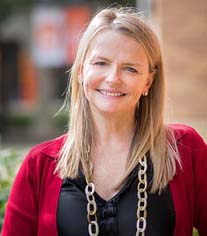Contact: Steven Lee, 210-450-3823, lees22@uthscsa.edu
SAN ANTONIO, Dec. 13, 2022 – With the U.S. grappling with an unprecedented opioid-related overdose crisis, The University of Texas Health Science Center at San Antonio (UT Health San Antonio) has been awarded a $1.8 million grant from the National Institutes of Health to research peer recovery support services for people living with opioid use disorder.
While medication for opioid use disorder can reduce rates of disease or deaths, data suggests that certain support services both aid treatment and sustain long-term recovery.
Those services can include emerging “peer” support, in which individuals with lived experience in addiction have specialized training in supporting others during their recovery by providing non-clinical linkages to treatment – such as mentorship, referrals for medical illnesses, occupational training, housing and education. However, there are gaps in knowledge of the approach that limit broader adoption.

“This is what this new grant funding is designed to address,” said Jennifer Sharpe Potter, PhD, MPH, vice president for research and professor of psychiatry and behavioral sciences at UT Health San Antonio, and a principal investigator for the NIH grant funding along with Robert Ashford, PhD, CEO of RecoveryLink, a recovery support technology company. Potter also is executive director of Be Well Texas, a statewide initiative of UT Health San Antonio funded by Texas Health and Human Services, providing equitable access to treatment and care for substance use disorder (SUD).
“We propose a research network that will provide systematic integration and collaboration between researchers and community-based organizations and develop a pipeline of future recovery scientists to close empirical and practice gaps in peer recovery support services, or PRSS,” she said.
Focus on stakeholder engagement
A lot is at stake with the effort, amid a backdrop of 107,000 opioid-related drug overdose deaths in the U.S. in the 12 months ending in January 2022, according to the Centers for Disease Control.
The Peer Recovery Innovation Network, the name of the new research network under the grant effort, will focus on stakeholder engagement in research agenda-setting, enhance the infrastructure for PRSS recovery science research and accelerate the growth of the PRSS evidence base in priority areas and populations, with training and telementoring as key approaches.
“We will utilize the innovative Extension for Community Healthcare Outcomes, ECHO, model,” said Adrienne Lindsey, DBH, MA, director of the Center for Substance Use Training and Telementoring at UT Health San Antonio. “This telementoring model will be used to expose researchers and clinicians interested in recovery support services and recovery science to the latest research findings and best practice, as well as provide a platform to vet research works in progress to get critical feedback from colleagues and subject matter experts in a budding field.”
Expanding recovery science
The effort will expand recovery science by developing a research program on PRSS during medication for opioid use disorder treatment using a novel research agenda-setting approach and an associated collaborative process, training and mentoring, and infrastructure development.
Specific aims include:
- Establish a Recovery Science Collaboratory to include multiple stakeholders, including individuals with lived recovery experience, to accelerate the pace of innovation in recovery science.
- Establish a Recovery Science Training and Telementoring program within UT Health San Antonio’s Center for Substance Use Training and Telementoring to rapidly expand the recovery science workforce.
- Conduct process-, outcome- and implementation-based evaluations of the Peer Recovery Innovation Network and recovery science initiative in the network to optimize the impact, efficiency and effectiveness for fostering recovery science and monitoring outcomes using defined measures.
“We believe all this will inform development and expansion of services and strengthen the system of care that those with opioid use disorder may use to initiate and maintain recovery,” Potter said.
The University of Texas Health Science Center at San Antonio (UT Health San Antonio), a primary driver of San Antonio’s $44.1 billion health care and biosciences sector, is the largest academic research institution in South Texas with an annual research portfolio of $360 million. Driving substantial economic impact with its six professional schools, a diverse workforce of more than 7,900, an annual operating budget of $1.08 billion and clinical practices that provide 2.6 million patient visits each year, UT Health San Antonio plans to add more than 1,500 higher-wage jobs over the next five years to serve San Antonio, Bexar County and South Texas. To learn about the many ways “We make lives better®,” visit UTHealthSA.org.
Stay connected with The University of Texas Health Science Center at San Antonio on Facebook, Twitter, LinkedIn, Instagram and YouTube.


